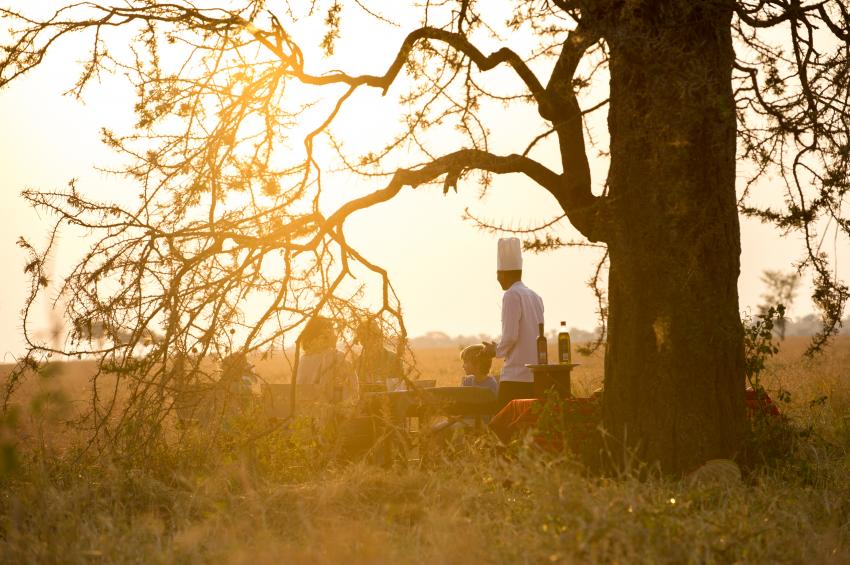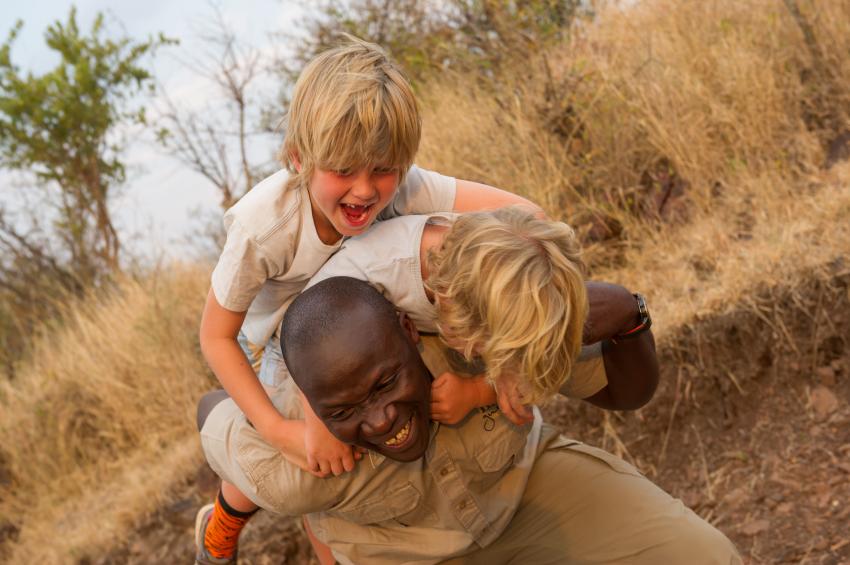Embarking on a safari with a baby or toddler is not a common occurrence due to the remote settings of lodges and the adventurous nature of travel. But that doesn’t mean it’s impossible…or even a bad idea. Sharing this unforgettable experience with the newest addition(s) to your family has the potential to create treasured memories that you’ll remember for years to come.
If you do decide to book a Tanzania safari tour with your littlest ones, there are a few things you should keep in mind and consider before taking the plunge. In this guide, we’ll share with you 10 tips for having the best safari in Africa with your young family while being safe and comfortable at the same time.
1. Book early

One of the first things you need to think about when planning an African safari with young children in tow is that family suites and rooms are limited. So if you’re after a family villa or interconnected rooms, book as early as possible, particularly during the peak safari season.
Consider a lodge that has air conditioning so your young adventurers have somewhere comfortable to nap during the heat of the day, as well as a swimming pool to splash around in. If you want room to move and space to prepare your own snacks, look for suites with a kitchenette that’s equipped with a fridge and microwave for warming up bottles.
2. Don’t move around too much

A classic Tanzania safari often involves a couple of nights at one lodge before moving to another for a few nights. But if you’re travelling with young kids, you might want to consider staying in one place that is suitable as a base to help minimise the disruption of having to pack/unpack multiple times and transfer long distances by road or air.
If you do want some variety, consider adding on a beach vacation at the end of your Tanzania safari holiday in somewhere like Zanzibar where you can just kick back and relax for a few days. You don’t have to worry about the early mornings and late nights of being on safari and there are plenty of resorts with kids’ clubs and babysitters available.
3. Check the lodge or camp’s age restrictions

If you have got your heart set on a particular lodge or camp, check whether they have any age restrictions for children. Some accommodations are adults only while others will allow children over a certain age. In addition, some will permit younger children to stay but have age restrictions on activities they can do, such as walking safaris. So make sure you’re crystal clear about the rules in place to avoid disappointment on arrival.
4. Find out whether you’ll be in a malaria-affected area

Another consideration before booking a Tanzania safari package is whether it involves staying or travelling through malaria-affected areas. Some toddlers and babies may not be able to take malaria prophylactics, so travelling in malaria zones must be avoided at all costs. You also need to chat with your doctor about any other vaccinations that you may need before travelling to East Africa and whether your children are old enough to have them administered safely.
5. Consider whether the lodge is fenced in

Remember that being on a safari often means being immersed in the wild, with animals (including predators) roaming freely around you. If you’re travelling with young children, it’s essential that you stay in a lodge or camp that is fully fenced to ensure no animals can wander in during the day or at night. This will limit where you can stay but it’s much better to be safe than sorry!
6. Look for lodges and camps with kids’ clubs and/or babysitters

Some lodges and camps have been designed specifically with families in mind and include facilities that are designed to make the safari experience as easy on parents as possible. Look for lodges and camps that have kids’ clubs or run child-specific activities, such as arts and crafts or short nature walks, as well as offering professional babysitters who can keep an eye on your young ones while you’re out on game drives.
Keep in mind that most properties won’t have television and Wi-Fi can sometimes be limited, so activities other than watching/streaming children’s TV shows need to be considered.
7. Drive rather than fly

Flying with toddlers and babies can be challenging at the best of times but it’s even more difficult on light aircraft that are unpressurised and cramped. These aircraft are also more susceptible to turbulence that can result in motion sickness and they will sometimes take off and land multiple times to collect other guests en route to your destination.
So if possible, opt to drive to your lodge or camp, rather than fly. This will give you space to spread out and stop whenever you need, as well as allowing you to bring all the essential gear that children require, without being limited by the (very small) light aircraft baggage allowances. If you do decide to fly, remember that you’ll need to squeeze all your nappies, formula and baby clothing into a soft duffel-style bag that can easily fit into the aircraft’s small baggage compartment.
8. Book a private game-drive vehicle

This is a decision that might be made for you, with many lodges and camps insisting that families with young children book private game drive vehicles. This is because being quiet and sitting still is all part of the wildlife-viewing experience and loud or wriggly children could affect other guests. Some properties will also restrict how close vehicles carrying young passengers can get to predators, particularly if you’re travelling in an open vehicle.
But even if the lodge doesn’t enforce a private vehicle, it’s a good idea for your family to consider one. It means you can return to the camp when your children have had enough or you can drop them back there with the babysitting service, then continue with the rest of your game drive.
Keep in mind that the safari schedule means you’ll be up before dawn for early morning game drives and it can be hot, dusty and bumpy in the bush. So consider whether your toddler or baby is up for the adventure before taking the plunge.
9. Come prepared

Most lodges and camps are located in remote areas, so you need to come prepared with everything you and your toddler needs. Some properties will have small boutiques where you can buy souvenirs, snacks and basic toiletries but they won’t be stocked with baby supplies, such as diapers, wipes and lotions.
You also need to bring medicine for any possible ailment, such as upset stomachs, teething, vomiting, fever, rashes and constipation. Baby sunscreen, painkillers and ointments for stings or bites are also essential, together with any other medications or formulas advised by your GP.
10. Be flexible with feeding

If possible, breastfeeding is going to be easier than dealing with bottles, particularly if you don’t have access to a kitchenette where you can sterilise and warm bottles. You may also need to be flexible with the solids you’re feeding your toddler if you run out of supplies due to the limited availability of baby products. Most kitchens will be able to boil vegetables, such as pumpkin, potatoes or carrots that can easily be mashed up if need be.
Check out our collection of a handpicked Family Safari Lodges perfect for a family Safari.
















